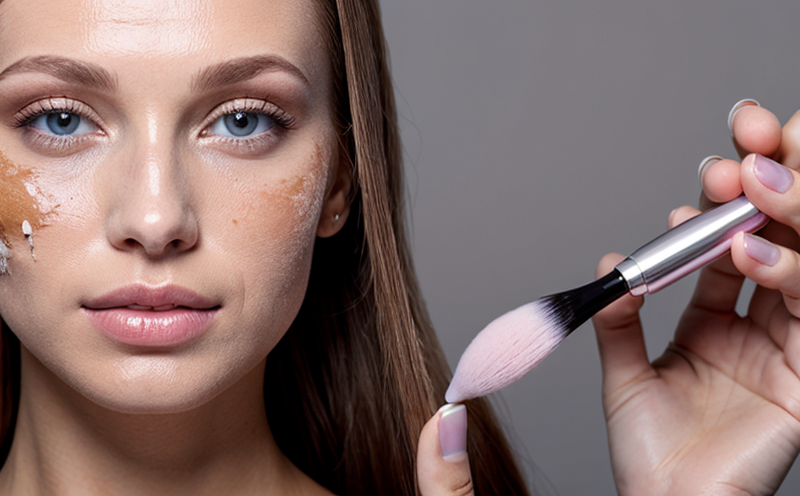Recall Verification Testing for Cosmetic Products
In the highly regulated world of cosmetics, recall verification testing plays a pivotal role in ensuring product safety and compliance with regulatory standards. This service is critical for quality managers, compliance officers, R&D engineers, and procurement teams who are responsible for safeguarding public health and maintaining brand integrity.
Recall verification tests are designed to confirm that cosmetic products no longer pose a risk to consumers after they have been recalled by the manufacturer or regulatory authorities. These tests aim to identify any potential hazards associated with the product, such as contamination, ingredient mislabeling, or packaging defects, ensuring that the product is safe for use.
The process begins with the receipt of the recalled cosmetic product and its documentation. The laboratory performs a comprehensive examination using state-of-the-art equipment and methods to assess various parameters critical to the safety and efficacy of the cosmetic. This includes microbiological testing, chemical analysis, ingredient verification, stability studies, and packaging integrity checks.
Microbiological testing ensures that the product is free from harmful bacteria, fungi, or viruses that could cause infections or allergic reactions. Chemical analysis helps in identifying any contaminants or impurities that might have been introduced during manufacturing or processing. Ingredient verification involves cross-referencing the product ingredients with its label to ensure accuracy and compliance with international standards.
Stability studies are conducted to evaluate how well the cosmetic maintains its quality over time under various storage conditions. Packaging integrity checks ensure that the packaging is suitable for containing the product without compromising its integrity or safety during transport and use.
The results of these tests are meticulously documented, and a detailed report is prepared for the client. This report includes findings from all the tests performed, along with recommendations on whether the recalled cosmetic can be safely returned to market or should be destroyed. The testing process adheres to international standards such as ISO 22716:2013, which sets guidelines for personal care products.
By employing this service, clients benefit from a thorough and reliable assessment of the recalled cosmetic product. This ensures that any potential risks are identified and addressed promptly, thereby protecting public health and maintaining consumer trust. The laboratory’s expertise in regulatory compliance ensures that all tests comply with relevant regulations such as those set forth by the European Union Cosmetics Regulation (EC) No 1272/2008.
The success of a recall verification program is not just about testing; it's also about communication and cooperation. The laboratory works closely with clients to provide clear, actionable insights that can be used to improve product quality and safety in the future.
Why It Matters
The importance of recall verification testing cannot be overstated in the cosmetics industry. A single safety issue or regulatory non-compliance can have severe consequences, including legal penalties, damaged brand reputation, and loss of consumer trust. By conducting thorough recall verification tests, manufacturers can demonstrate their commitment to product safety and compliance with international standards.
Recall verification testing also helps in mitigating the risks associated with potential recalls. It ensures that only products that meet strict quality and safety standards are returned to market, thereby protecting consumers from any harm. This proactive approach not only enhances brand reputation but also fosters customer loyalty and trust.
In addition, adherence to regulatory requirements is a legal obligation for cosmetic manufacturers. Non-compliance can lead to fines, product seizures, and even criminal charges in some jurisdictions. By engaging with a reputable laboratory for recall verification testing, companies can ensure that they are meeting these obligations and reducing the risk of non-compliance.
The results of recall verification tests also provide valuable insights into the performance of the manufacturing process and the quality control measures in place. This information can be used to identify areas for improvement and implement corrective actions to prevent similar issues from occurring in the future.
Environmental and Sustainability Contributions
The environmental impact of cosmetics is becoming an increasingly important consideration, especially as consumers demand more sustainable products. Recall verification testing supports this trend by ensuring that recalled products are properly disposed of or recycled where possible, rather than being released back into the market.
By conducting thorough tests and providing detailed reports, laboratories like ours help manufacturers make informed decisions about product disposition. This can include recycling, donating to charity, or safely disposing of the product through approved channels. Such actions not only reduce waste but also contribute positively to environmental sustainability.
In addition, recall verification testing ensures that products are free from hazardous substances and ingredients that could harm the environment during production, use, or disposal. This aligns with broader sustainability goals within the cosmetics industry and helps companies meet their corporate social responsibility (CSR) objectives.
The process of recall verification also encourages continuous improvement in manufacturing practices. By identifying potential risks and issues early on, manufacturers can implement more sustainable processes that reduce waste, energy consumption, and environmental impact throughout the product lifecycle.
Competitive Advantage and Market Impact
In today’s competitive market, maintaining a strong reputation for quality and safety is crucial for cosmetic brands. Recall verification testing provides a strategic advantage by demonstrating commitment to consumer health and regulatory compliance.
A brand that successfully navigates recalls through rigorous testing not only maintains its standing but also enhances its reputation as a leader in product safety. This can translate into increased customer loyalty, higher market share, and improved brand perception among consumers.
Furthermore, recall verification testing helps cosmetic companies stay ahead of regulatory changes and emerging standards. By proactively addressing potential issues through comprehensive testing, manufacturers can ensure that their products meet or exceed all relevant regulations, giving them a competitive edge in the marketplace.
The process of recall verification also fosters collaboration between different stakeholders within an organization, including quality assurance teams, compliance officers, and R&D engineers. This cross-functional approach ensures that all aspects of product safety and compliance are addressed comprehensively, contributing to overall business success.





